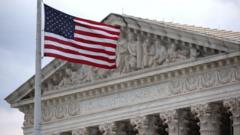The Supreme Court has upheld a lower court's decision preventing public funding for a charter school run by the Catholic Church in Oklahoma. The tie vote underscores the complex debate surrounding religious institutions and taxpayer money.
Supreme Court Ruling Halts Funding for Oklahoma's Religious Charter School

Supreme Court Ruling Halts Funding for Oklahoma's Religious Charter School
The US Supreme Court's 4-4 ruling blocks public funding for the proposed first religious charter school in Oklahoma, citing constitutional concerns.
The US Supreme Court has effectively blocked Oklahoma's attempts to establish the nation's first charter school funded by public money that incorporates religious teachings. In a tightly contested ruling, the justices deadlocked at 4-4, thus affirming a previous decision from the Oklahoma State Supreme Court, which concluded that funding the charter school would contravene the US Constitution's prohibition on government endorsement of religion.
The proposed school, to be operated by the Catholic Archdiocese of Oklahoma City and the Diocese of Tulsa, was projected to receive approximately $23.3 million in state funds over five years. Charter schools, like the one in question, are publicly funded but autonomously managed institutions. While the Supreme Court's recent decision does not set a national precedent, it opens the door for potential future cases regarding the intersection of educational funding and religious establishments.
The court's deliberations did not reveal how each justice voted, but they seemed divided along ideological lines during an earlier hearing, and Justice Amy Coney Barrett refrained from participating, providing no explanation. The only communication regarding the ruling was a one-page notice stating, "The judgment is affirmed by an equally divided Court."
Legal observers viewed this case as a crucial reflection of the 1st Amendment's constraints concerning religion and governance, which historically have prohibited taxpayer funding for religious entities, including schools.
Oklahoma's Attorney General Gentner Drummond welcomed the court's ruling, emphasizing the importance of protecting taxpayers from funding religious schools. In his statement, he framed the decision as a victory for religious liberty, arguing that it mitigated the risk of taxpayer dollars being directed to "radical Islamic schools." He insisted that the ruling was necessary to uphold foundational principles of American governance.
On the other hand, proponents of the charter school contended that the failure to secure funding resulted in religious discrimination. Officials expressed disappointment in the ruling, reaffirming their commitment to providing educational choice and announcing plans to explore alternatives for delivering virtual Catholic education.
The St. Isidore of Seville Virtual Catholic Charter School sought to serve around 500 students, providing online education interwoven with religious instruction. Initial approval by the Oklahoma State Virtual Charter School Board sparked significant controversy, with differing political factions sharply divided. Governor Kevin Stitt supported the establishment of the charter, while Attorney General Drummond opposed it, leading to his legal challenge.
Charter schools constitute a small segment of the US educational landscape but have garnered increasing support from conservative advocates. The issue of public funding for religious education illustrates a broader national debate about educational choice, state funding, and religious liberty, raising many questions about the balance of these critical issues in American society.






















